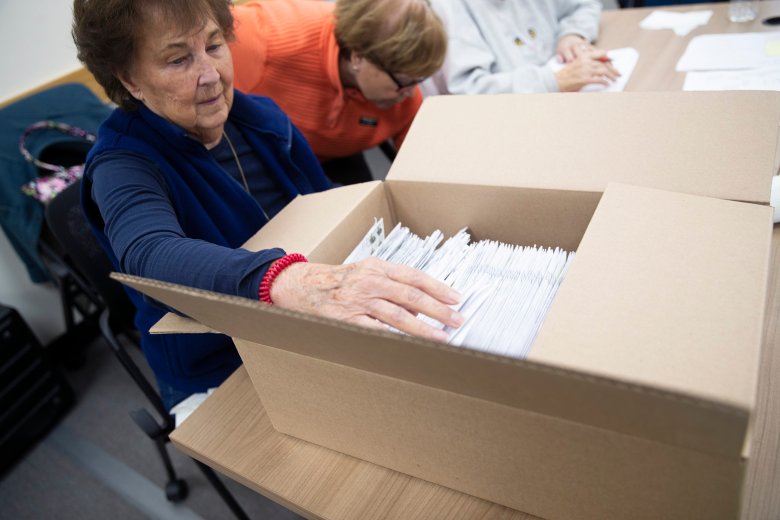Politics
Maine’s Absentee Voting Faces Challenges with November Question 1

In November 2024, Maine voters will face Question 1, a measure that could significantly alter absentee voting procedures. While it is framed as a step towards “election integrity,” the proposed changes may create unnecessary barriers for many residents, particularly those who rely on absentee ballots to participate in the democratic process.
Paul Richardson, a resident of Yarmouth and a longtime advocate for absentee voting, voiced his concerns about the implications of this proposal. He has consistently exercised his right to vote since 1992, but his job often keeps him away from home on Election Day. For Richardson and many Mainers with similar commitments, absentee voting is vital for maintaining their civic engagement.
The specifics of Question 1 include several notable restrictions. It reduces the absentee voting window by two days, prohibits prepaid return postage, limits towns to a single drop box, and eliminates ongoing absentee status for seniors and voters with disabilities. Additionally, it introduces a photo ID requirement for absentee ballots, which could complicate the voting process for those unable to provide the necessary identification on short notice.
The concern for many is that these changes may hinder rather than enhance participation. For workers with demanding schedules, the added requirements could mean that ballots miss crucial deadlines or do not arrive in time.
Research supports the efficacy and security of absentee voting. According to the MIT Election Data and Science Lab, mail voting has tripled since 2000 and now represents a significant portion of ballots cast in the United States. This trend is not simply a response to the COVID-19 pandemic; rather, it reflects a modern adaptation to busy lifestyles.
Security measures around absentee voting are robust. These include signature verification, bipartisan processing, and strict ballot tracking protocols. Independent evaluations by nonpartisan experts have verified these safeguards, highlighting that fraud related to mail ballots is exceptionally rare. Studies consistently show that instances of fraud are minimal and often isolated.
The United States Postal Service also plays a critical role in the success of absentee voting. In 2024, the USPS delivered over 99.2 million ballots, with an impressive 99.88% reaching election officials within a week. Such performance underscores the reliability of mail services, often exceeding the capabilities of private carriers.
Maine has demonstrated a strong commitment to absentee voting, as evidenced by the high turnout rates in recent elections. In 2024, absentee voting reached its second-highest levels in presidential election cycles, indicating that many residents appreciate the convenience and flexibility it offers due to their busy lives.
The question now is what problem Question 1 seeks to solve. If the aim is to boost voter confidence, existing protocols already provide a solid foundation. However, if the goal is to increase participation, the proposed measure appears counterproductive. By reducing the voting window, increasing paperwork, and limiting access, it may discourage residents from exercising their right to vote.
For those who travel for work or have demanding schedules, absentee voting is not merely an option; it is essential for fulfilling civic duties. Democracy should adapt to the lives of its constituents, and Question 1 risks making the voting process more cumbersome without clear benefits.
As residents prepare to cast their ballots this November, Richardson plans to vote in favor of protecting absentee voting. He advocates for a system that accommodates all Mainers, asserting that one’s work commitments should not dictate whether their voice is heard in the democratic process.
-

 Science4 weeks ago
Science4 weeks agoALMA Discovers Companion Orbiting Giant Red Star π 1 Gruis
-

 Top Stories2 months ago
Top Stories2 months agoNew ‘Star Trek: Voyager’ Game Demo Released, Players Test Limits
-

 Politics2 months ago
Politics2 months agoSEVENTEEN’s Mingyu Faces Backlash Over Alcohol Incident at Concert
-

 World2 months ago
World2 months agoGlobal Air Forces Ranked by Annual Defense Budgets in 2025
-

 World2 months ago
World2 months agoElectrification Challenges Demand Advanced Multiphysics Modeling
-

 World2 months ago
World2 months agoMass Production of F-35 Fighter Jet Drives Down Costs
-

 Business2 months ago
Business2 months agoGold Investment Surge: Top Mutual Funds and ETF Alternatives
-

 Science2 months ago
Science2 months agoTime Crystals Revolutionize Quantum Computing Potential
-

 Top Stories2 months ago
Top Stories2 months agoDirecTV to Launch AI-Driven Ads with User Likenesses in 2026
-

 Entertainment2 months ago
Entertainment2 months agoFreeport Art Gallery Transforms Waste into Creative Masterpieces
-

 Health2 months ago
Health2 months agoGavin Newsom Critiques Trump’s Health and National Guard Plans
-

 Business2 months ago
Business2 months agoUS Government Denies Coal Lease Bid, Impacting Industry Revival Efforts









